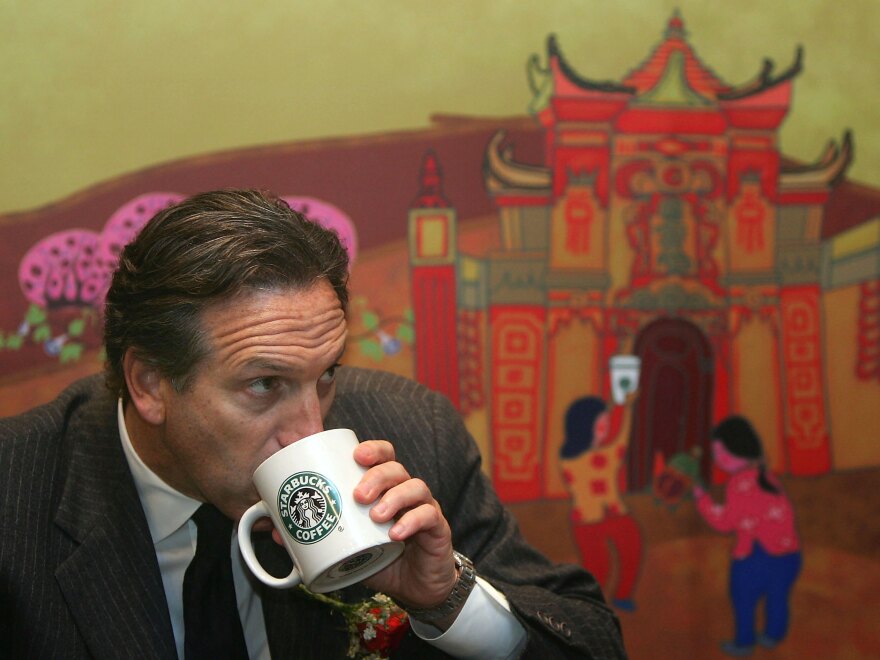Updated March 16, 2022 at 3:53 PM ET
Amid the great resignation, a big one.
Starbucks has announced that its president and CEO Kevin Johnson is retiring after 13 years with the company, five of them as CEO. He leaves April 4.
The announcement came just hours before the company's annual shareholder meeting. Howard Schultz, who led Starbucks for three decades and built the company from 11 stores and 100 employees to 28,000 stores worldwide, will return as interim CEO. He is taking on the position as a volunteer, the company said, with compensation of $1.
The Starbucks Board of Directors thanked Johnson for his leadership, citing the challenges brought on by the pandemic, which it called "one of the most difficult periods in modern history."
In a statement, Johnson, 61, indicated his departure was planned, noting he had signaled to the Starbucks board a year ago that he would consider retiring as the pandemic came to an end.
"I feel this is a natural bookend to my 13 years with the company," he said.
After an initial plunge in the very early days of the pandemic, Starbucks shares began a steady recovery in mid-2020 and soared to a record high last summer. Even as restaurants struggled, coffee sales were strong, in part thanks to Starbucks' drive-throughs. By spring of 2021, the company said U.S. sales had made a "full recovery."
But Starbucks has not been able to slow a that took off in Buffalo, New York, last year. In December, two out of three stores voted to join Workers United, affiliated with the Service Employees International Union, becoming the first Starbucks stores in the U.S. to form unions. Since then, four more stores — one in Mesa, Arizona, and — have joined them, and more than 130 other locations have petitioned for union votes.
On Tuesday, the National Labor Relations Board issued a formal complaint against Starbucks, alleging the company took retaliatory actions against two Arizona employees who were part of the union campaign.
At the shareholder meeting on Wednesday, Board Chair Mellody Hobson addressed the unionization efforts in her opening remarks.
"We hear the feedback, and we are committed to finding new ways to enhance and elevate what we call the partner experience," she said. "We truly believe the company has and can continue to deliver far more in direct partnership with our people."
Schultz's return to Starbucks at this moment makes sense to those who have followed him closely.
"It's in his blood, and it's personal for him," says Harvard Business School historian Nancy Koehn, who first wrote about Schultz in 1996.
Koehn expects Schultz will set up listening sessions with employees, to understand what's happening at the store level as well as the broader priorities of working Americans.

"Howard has an uncanny and I think unusually strong ability to understand the zeitgeist of a particular moment — socially, politically, psychically, economically," she says.
Schultz, who led Starbucks from 1987 until 2018, said in a statement he had not planned to return to Starbucks but knows the company is at a point where it must transform once again.
"Our success is not an entitlement," he said. "We must continue to earn the trust of our people and our customers every day."
In Buffalo on Wednesday, Jaz Brisack, a barista at the first Starbucks location to unionize, decried what she described as Starbucks' union-busting activities, including by Schultz himself.
Schultz spoke at an employee event in Buffalo just days before the union vote last fall and issued an to all Starbucks employees.
"No partner has ever needed to have a representative seek to obtain things we all have as partners at Starbucks," he wrote on November 6, 2021. "I am saddened and concerned to hear anyone thinks that is needed now."
Brisack says that upon his return she expects Schultz to repeat the same message he told workers in Buffalo. "That it's almost an insult to him personally for us to try to unionize, which we've made clear from day one — this isn't a criticism. It's actually a way for us to grow with the company and challenge the status quo."
Copyright 2022 NPR. To see more, visit https://www.npr.org.



